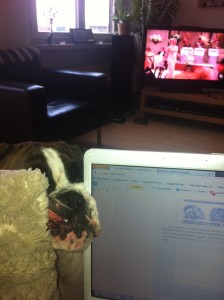Hi everyone,
Last year, our school hosted a speaker, Dr. JoAnn Deak, for professional development. She is an educator and psychologist, and she spoke to our staff about ‘stretching bands’ in students’ minds, and how to do this in a way that causes a measure of healthy stress so real learning happens as much as possible. ‘Stretching bands’ means causing a bit of tension, and putting someone out of their comfort zone. The end result of band-stretching is noticeable learning in areas that once made you nervous. ETEC 540 stretched my bands more than any other course I’ve taken in MET so far. From the beginning of this course, I think, we were exposed to a form of this dynamic with Neil Postman’s depiction of Socrates telling his friend Phaedrus a story about Thamus and Theuth, two figures beginning a dialogue about what unknown territory they were about to embark on with the invention of writing (Postman, p. 4). What will writing do to consciousness? Will it truly be useful or will it create superficiality? I felt similar sentiments when looking at the impressive list of unknown resources in our Rip.Mix.Feed activity. What are these? What purpose do they really serve? Will some of these technologies change how I socialize and organize? If so, for better or worse? Will I be organized online and socialize less with my family? What’s the trade off in all this? I think this course has been brilliant for pushing members (me anyway!) into the unknown, whether it was looking back to pre-computerized technology and considering changes because of them, or through the challenge of contributing meaningful to varied spaces (discussion threads, course blog, wiki,) after synthesizing reading.
One point that resonates with me from our impressive list of readings was from Ong’s chapter Print, Space and Closure. He reminds readers that historically one of writing’s purposes was to recycle knowledge back into the oral world, and I have thought a lot about that point when considering later readings, blog posts and threaded discussions, particularly from Bolter in Breakout of the Visual (Ong p. 117) and especially when considering modern teens and how many are glued in some way to a form of technology. I find myself wondering – if writing served to recycle knowledge back into the oral world, if in modern terms all of the time and attention sucking technologies are serving a similar purpose and creating a new ‘cultural moment’ (Bolter, p. 47). We spend more time online and with technologies, but doesn’t this make us want to share what we gain from them? Aren’t we talking more about the technologies we are using? Is a new form of oral culture emerging from the online visual one? Ong is quite clear when he argues written words leave residue but oral tradition does not (p. 11), but I’ve felt myself questioning this when I consider the complexity of how the two interact.
I have to remind myself in this MET program to take a breath and focus on the quality as opposed to quantity of interactions. I found myself worried a fair bit about if I had done ‘enough’ here and ‘enough’ there. Because of how the course was spread out with two section, I feel I made less personal connection, but the trade-off to that was the exposure to so many unique perspectives. I’d like to thank all of you for a band-stretching course and for the immense support from Jeff and Teresa. I also include this picture of my dog Desi – she reminds me daily that being too consumed by technology simply will not do. I call it ‘Breakout of the Boxer’.
Best wishes,
Ginelle
References:
Bolter, J. (2001). Writing space: Computers, hypertext, and the remediation of print [2ed]. Mahwah, NJ: Lawrence Erlbaum.
Ong, W. (2002). Orality and Literacy. London: Routledge.
Postman, N. (1992). Technopoly: The Surrender of Culture to Technology, The Judgement of
Thamus. New York: Vintage Books.



Just like Simon and Garfunkel said, the boxer’s “story’s seldom told,” after all. Your boxer’s just trying to make sure it makes it in… and it did!
Quanlity over quantity, & the pressure to read everything (or not) was something I always wrestled with, too. Too bad I think I figured it out by around course eight or nine!
Hi Ginelle,
I agree with your point regarding technology’s retelling of writing. It’s an interesting cycle, one from oral to written, then from written to digital (and possibly back to oral?).
-Jerry
Hi Ginelle,
I just have to say, I think Desi has a great point! Technology can quickly become all consuming if we aren’t careful. Good thing you have someone to remind you to take breaks once and a while. (oh, and fantastic reflection on connections too. I love what you had to say about how the course pushed us into the unknown).
Kym